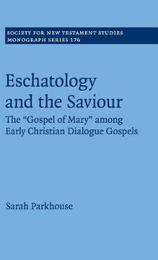
|
Eschatology and the Saviour: The 'Gospel of Mary' among Early Christian Dialogue Gospels
Hardback
Main Details
| Title |
Eschatology and the Saviour: The 'Gospel of Mary' among Early Christian Dialogue Gospels
|
| Authors and Contributors |
By (author) Sarah Parkhouse
|
| Series | Society for New Testament Studies Monograph Series |
|---|
| Physical Properties |
| Format:Hardback | | Pages:306 | | Dimensions(mm): Height 223,Width 144 |
|
| Category/Genre | Religion and beliefs
Christianity
Biblical studies
Christian theology |
|---|
| ISBN/Barcode |
9781108498937
|
| Classifications | Dewey:229.8 |
|---|
| Audience | | Professional & Vocational | |
|---|
| Illustrations |
Worked examples or Exercises
|
|
Publishing Details |
| Publisher |
Cambridge University Press
|
| Imprint |
Cambridge University Press
|
| Publication Date |
5 September 2019 |
| Publication Country |
United Kingdom
|
Description
This book focuses on the 'Gospel of Mary' in the context of a broader analysis of early Christian dialogue gospels - a popular literary genre used to present Jesus as conversing with select disciples and answering a series of questions on life, death and the cosmos at the conclusion of his earthly career. Jesus' teachings in these texts can vary greatly, from affirming the resurrection of the flesh to denying it completely. This book highlights the diversity of perspective within this genre, bringing together New Testament, 'gnostic' and (proto-)orthodox texts. Yet each text is based on the premise that it contains new or clarified teaching from the risen or glorified Lord, often in the form of a final revelation concerned with the disciples' eschatological salvation. This book offers a fresh and in-depth analysis of the 'Gospel of Mary' in the context of the dialogue gospel genre, concentrating on the narrative frame, the eschatological teachings, and the relationship between the two.
Author Biography
Sarah Parkhouse is a research fellow at the Australian Catholic University, Melbourne. She is co-editor of Connecting Gospels (2018) and is interested in bringing New Testament texts into conversation with other early Christian literature.
|